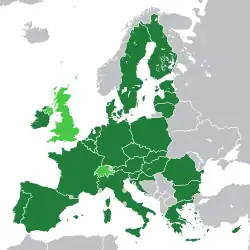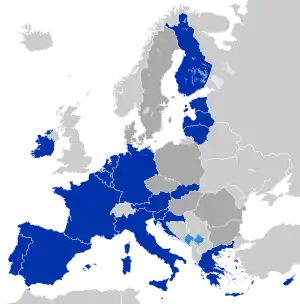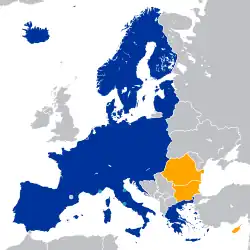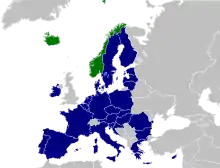2024 European Parliament election
The 2024 European Parliament election is scheduled to be held on 6 to 9 June 2024.[1] This will be the tenth parliamentary election since the first direct elections in 1979, and the first European Parliament election after Brexit, therefore without the participation of the United Kingdom anymore.[2][3]
| ||||||||||||||||||||||||||||||||||||||||||||||||||||||||||||||||||||||
All 720 seats to the European Parliament 361 seats needed for a majority | ||||||||||||||||||||||||||||||||||||||||||||||||||||||||||||||||||||||
|---|---|---|---|---|---|---|---|---|---|---|---|---|---|---|---|---|---|---|---|---|---|---|---|---|---|---|---|---|---|---|---|---|---|---|---|---|---|---|---|---|---|---|---|---|---|---|---|---|---|---|---|---|---|---|---|---|---|---|---|---|---|---|---|---|---|---|---|---|---|---|
| ||||||||||||||||||||||||||||||||||||||||||||||||||||||||||||||||||||||
| ||||||||||||||||||||||||||||||||||||||||||||||||||||||||||||||||||||||
Overview
This term's election is expected to be one of the more contentious elections in the history of the European Parliament given the rise of far right parties in polling.[4][5] The EPP in particular has raised eyebrows given its efforts to charm parties in the ECR to create a broad conservative block[6] that could upset the long standing balance which has seen the EPP share power with the center-left S&D and the centrist Renew Group.[7]
Electoral system
Attempts at electoral reform
In June 2018, the Council agreed to change the EU electoral law and to reform old laws from the 1976 Electoral Act as amended in 2002.[8] New provisions included a mandatory 2% threshold for countries with more than 35 seats and rules to prevent voters from voting in multiple countries.[9] After the Act was adopted by the Council following consent given by the European Parliament in July 2018, not all member states ratified the Act prior to the 2019 elections, which took place under the old rules. As of 2023, the reform has yet to be ratified by Cyprus, Germany and Spain.[10]
On 3 May 2022, the European Parliament voted to propose a new electoral law, which would contain provisions for electing 28 seats on transnational lists.[11] As of 2023, this reform has not been approved by the Council, which must approve it unanimously.[12]
Spitzenkandidat system
In the run-up to the 2014 European Parliament elections a new informal system was unveiled for the selection of the European Commission President dictating that whichever party group gained the most seats would see their lead candidate become President of the Commission.[13] In 2014, the candidate of the largest group, Jean-Claude Juncker, was eventually nominated and elected as Commission President.[14] European party leaders aimed to reintroduce the system in 2019, with them selecting lead candidates and organizing a televised debate between those candidate.[15] In the aftermath of the election German Defense Minister Ursula von der Leyen was chosen as Commission President, even though she had not been a candidate prior to the election, while Manfred Weber, lead candidate for the EPP, which had gained the most seats, was not nominated.[16] Following the non-application of the system in 2019, some have called for the system to be revived, in the upcoming elections.[17][18][19]
As of 2023, the EPP[20] EGP,[21] and PEL[22] have announced their intensions to nominate a main candidate in 2024, while ECR and ID have rejected doing so.[23]
Apportionment
As a result of Brexit, 27 seats from the British delegation were distributed to other countries in January 2020 (those elected in 2019, but not yet seated took their seats).[24] The other 46 seats were abolished with the total number of MEPs decreasing from 751 to 705 after that.[25]
A report in the European Parliament proposed in February 2023 and passed in June 2023 to modify the apportionment in the European Parliament and increase the number of MEPs again in order to adapt to the development of the population and preserve degressive proportionality.[26][27] The European Council will, by unanimity, take the final decision on the size of the European Parliament and each national seat quota. On 26 July 2023, the Council reached a preliminary agreement, which would increase the size of the European Parliament to 720 seats.[28] On 13 September 2023, the European Parliament consented to this decision,[29] which was adopted by the European Council on 22 September 2023.[30]
Electoral system by country
Campaign
| This article is part of a series on |
 |
|---|
|
|
The future of Ursula von der Leyen
Should the spitzenkandidat system be used in 2024, Ursula von der Leyen, the current European Commission President, may face an uphill battle to make it to a second term. Although Germany's Chancellor Olaf Scholz has hinted he would support von der Leyen should she choose to run for the position again,[43] the coalition has also agreed to support the spitzenkandidat system.[44] This poses a challenge to von der Leyen's candidacy as this gives room to Manfred Weber, the leader of the EPP in the EP, and fellow German CDU/CSU member, to propose alternative candidates, such as Roberta Metsola, or to demand von der Leyen run for Parliament to secure the support of her party.[45] As of October 2023, von der Leyen has yet to announce whether she aims for a second term as Commission President.
Opinion polling and seat projections
Seats
The chart below depicts opinion polls of the number of seats for the groups in the EU Parliament using a 6-poll moving average.
Popular vote
The chart below depicts opinion polls of the popular vote share for the groups in the EU Parliament using a 6-poll moving average.
Controversies
Conflict with Portuguese national holiday
The dates chosen for the elections conflict with a long weekend in Portugal, where Portugal Day, a national holiday, is celebrated on 10 June, which is expected to suppress turnout.[46] Despite an attempt by Portuguese leaders to find a compromise, no change was made to the default date of 6–9 June,[47] which required unanimity to be changed.
Qatargate
The ongoing Qatargate corruption scandal, which began in December 2022, has destabilized the European Parliament following the arrest of several MEPs including Marc Tarabella; Andrea Cozzolino and Eva Kaili which was stripped of her vice presidency. Other suspects in the case include Francesco Giorgi, the parliamentary assistant of MEP Andrea Cozzolino; Pier Antonio Panzeri, founder of the Fight Impunity NGO; Niccolo Figa-Talamanca, head of the No Peace Without Justice NGO; and Luca Visentini, head of the International Trade Union Confederation.[48][49]
Notes
- 1 divided by the number of seats.
- Hare quota with residual fit by largest remainders
- Denmark allows for electoral alliances between separate party lists.
- Seats are apportioned to parties nationally, then subapportioned to the constituencies.
- Droop quota with residual fit by largest remainders
References
- "Council confirms 6 to 9 June 2024 as dates for next European Parliament elections". www.consilium.europa.eu. 2023-05-22. Retrieved 2023-05-24.
- "EUR-Lex - 12007L/TXT - EN - EUR-Lex". eur-lex.europa.eu. Retrieved 2021-07-15.
- "Elections". European Parliament. Archived from the original on 2018-06-28. Retrieved 2021-07-15.
- Rankin, Jennifer (2018-12-28). "How rising populism could shake up European elections". The Guardian. ISSN 0261-3077. Retrieved 2023-08-21.
- "Europe's conservatives want a piece of Giorgia Meloni". POLITICO. 2023-01-24. Retrieved 2023-08-21.
- "Europe's largest political party veers right ahead of 2024 election | Financial Times". www.ft.com. Retrieved 2023-08-21.
- Rosa, Brunello; Poettering, Benediict. "Can a Centre-Right Coalition Emerge After The Next EU Elections?". London School of Economics and Political Science. Retrieved August 21, 2023.
- "European Parliament elections: Council reaches agreement on a set of measures to modernise EU electoral law". June 7, 2018.
- "EUR-Lex - 32018D0994 - EN - EUR-Lex". eur-lex.europa.eu. Retrieved 2023-08-22.
- "Two years to go: What to expect from the 2024 European Parliament elections". Jacques Delors Centre. Retrieved 2023-08-22.
- "European Parliament votes in favor of reforming EU elections". POLITICO. 2022-05-03. Retrieved 2023-08-22.
- "LEAK: Most countries hesitant about EU electoral law reform". www.euractiv.com. 2023-07-05. Retrieved 2023-08-22.
- "What is a spitzenkandidat?". euronews. 2019-04-24. Retrieved 2023-08-21.
- "The EU's Spitzenkandidat 2.0 is heading for a fall | Financial Times". www.ft.com. Retrieved 2023-08-21.
- "First clashes liven up last EU Spitzenkandidat debate ahead of election". www.euractiv.com. 2019-05-16. Retrieved 2023-08-21.
- "Who killed the Spitzenkandidat?". POLITICO. 2019-07-05. Retrieved 2023-08-21.
- "Future of spitzenkandidaten could rest on next year's EU elections". euronews. 2023-05-19. Retrieved 2023-08-21.
- "Is the Spitzenkandidat system really dead? Not if we act now". www.euractiv.com. 2019-11-13. Retrieved 2023-08-21.
- "Why the EU's Spitzenkandidaten procedure should be revived before the next European Parliament elections". EUROPP. 2021-07-29. Retrieved 2023-08-21.
- "EPP backs spitzenkandidat, as other right parties abandon the process". www.euractiv.com. 2023-05-05. Retrieved 2023-08-22.
- "European Greens to field Spitzenkandidaten duo in 2024 EU elections". European Greens. Retrieved 2023-08-22.
- "The Left will have a spitzenkandidat for 2024 EU elections". www.euractiv.com. 2023-06-19. Retrieved 2023-08-22.
- "Liberals divided over 2024 EU election campaign strategy". POLITICO. 2023-07-05. Retrieved 2023-08-22.
- "Italian proposal for who gets British MEP seats". POLITICO. 2017-04-26. Retrieved 2022-09-09.
- "MEPs propose cut in their ranks after Brexit". POLITICO. 2017-09-07. Retrieved 2022-09-09.
- "Draft report on the composition of the European Parliament (2021/2229(INL) – 2023/0900(NLE))" (PDF). European Parliament. 2023-02-14. Retrieved 2023-04-19.
- "European elections 2024: Parliament proposes more seats for nine EU countries | News | European Parliament". www.europarl.europa.eu. 2023-06-15. Retrieved 2023-06-15.
- "European Parliament set to grow by 15 MEPs in 2024". POLITICO. 2023-07-28. Retrieved 2023-07-28.
- "2024 European elections: 15 additional seats divided between 12 countries | News | European Parliament". www.europarl.europa.eu. 2023-09-13. Retrieved 2023-09-14.
- "EUR-Lex - 32023D2061 - EN - EUR-Lex". eur-lex.europa.eu. Retrieved 2023-09-28.
- Oelbermann, Kai Friederike; Pukelsheim, Friedrich (July 2020). "The European Elections of May 2019" (PDF). europarl.europa.eu. p. 14.
- "16-year-olds in Belgium will be able to vote in European elections from 2024". www.brusselstimes.com. Retrieved 2023-01-07.
- "Volby do Evropského parlamentu - základní informace pro voliče - Volby". www.mvcr.cz (in Czech). Retrieved 2023-09-28.
- Af /ritzau (2023-10-05). "EU-valg: Her er datoen". ekstrabladet.dk (in Danish). Retrieved 2023-10-05.
- "| Valimised Eestis". www.valimised.ee. Retrieved 2023-10-06.
- Oy, Edita Publishing. "FINLEX ® - Uppdaterad lagstiftning: Vallag 714/1998". www.finlex.fi (in Swedish). 160 §. Retrieved 2023-07-30.
- "Quelles sont les dates des prochaines élections ?". Service-Public.fr (in French). 12 October 2023.
- "Wahltermin Europawahl 2024 - Die Bundeswahlleiterin". www.bundeswahlleiterin.de. Retrieved 2023-08-18.
- "Grozījumi Eiropas Parlamenta vēlēšanu likumā" [Amendments to the European Union Elections Act]. LIKUMI.LV (in Latvian). Retrieved 2023-07-20.
- "Dag van stemming". Kiesraad.nl (in Dutch). Retrieved 29 July 2023.
- "Kieswet". Overheid.nl. Article Y 2 & Article P 7, subsection 2. Retrieved 27 May 2023.
- "Vallag (2005:837)". www.riksdagen.se (in Swedish). 1 kap., 2 & 3 §. Retrieved 2023-07-30.
- "Ursula von der Leyen discreetly considers second term as European Commission president". Le Monde.fr. 2023-04-23. Retrieved 2023-08-21.
- "Germany's conservatives back EU's von der Leyen for second term — if she wants it". POLITICO. 2023-04-17. Retrieved 2023-08-21.
- "Ursula von der Leyen is fighting for Europe's conservative soul". POLITICO. 2023-08-03. Retrieved 2023-08-21.
- "EU riles Portugal by teeing up June dates for 2024 elections". POLITICO. 2023-05-10. Retrieved 2023-08-21.
- "Council confirms 6 to 9 June 2024 as dates for next European Parliament elections". Council of the EU. Council of the EU Press Office. 22 May 2023.
- "Corruption, cash and confessions: Who are the key suspects in the Qatargate scandal ?". France 24. 2023-01-21. Retrieved 2023-08-21.
- "Opinion | It's a Spectacular Scandal, and a Warning to Europe". 2023-03-15. Retrieved 2023-08-21.
Further reading
- Manuel Müller, Two years to go: What to expect from the 2024 European Parliament elections, Jacques Delors Centre, 30 May 2022.
.jpg.webp)

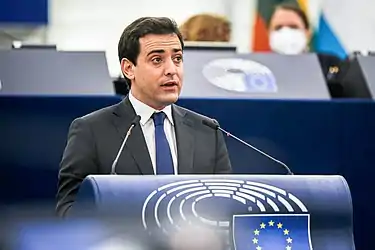
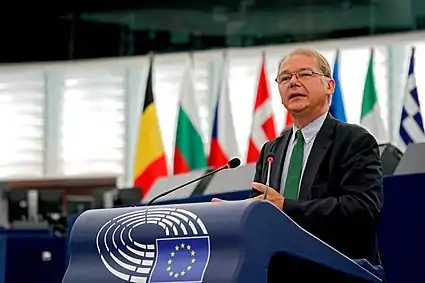
.jpg.webp)

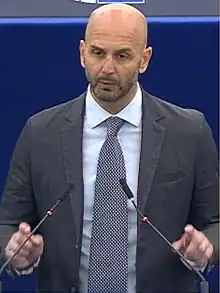
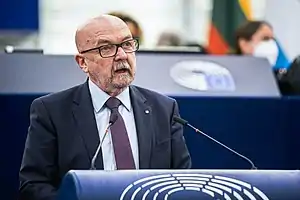
.jpg.webp)
.jpg.webp)
